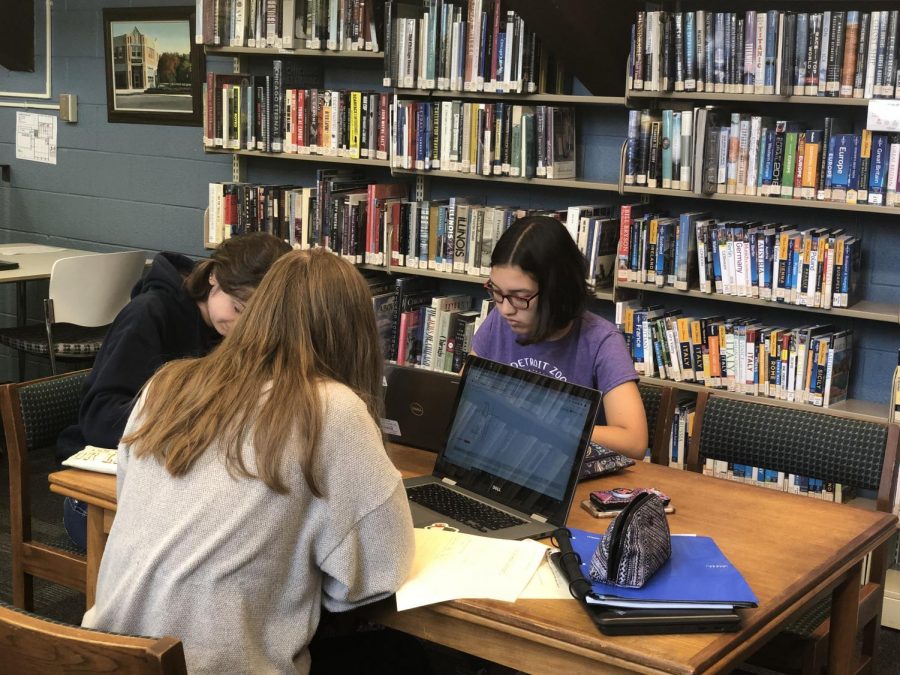School Board, Lake Bluff Library Join Forces
The Lake Bluff Library provides many services, including functional outlets and elegant wooden tables. Now residents of the unincorporated lands surrounding the village can enjoy this quiet refuge of small-town Americana.
September 23, 2019
At its monthly meeting on Monday, 9 Sep, the District 115 Board of Education unanimously voted to approve an intergovernmental agreement with the Lake Bluff Public Library that would allow LFHS students living in unincorporated Lake Bluff to check out library materials as if they were village residents, with a few restrictions. The vote makes the agreement effective immediately as the Library Board of Trustees approved it at its meeting last month.
The agreement comes at a cost of $500 to the district — slightly less than a one-semester senior parking pass. In exchange, students residing in the unincorporated regions outside of Lake Bluff proper — including Knollwood, a community of 1,800 that unsuccessfully sought annexation by the Village two decades ago — will be able to obtain membership cards for the same price as Lake Bluff residents, who fund the library through property taxes.
The specially-minted IGA cards are free for LFHS students, while standard non-resident cards cost what a given property would pay the Library in property taxes. However, only the student holding a given card may use it to check out library materials, and the cards are only valid at Lake Bluff Library — “reciprocal borrowing” is not permitted.
Senior Mark Smirnov, who lives in a triangle of unincorporated land between Lake Bluff and North Chicago, said that he did not have a library card and did not plan on buying one.
“They make the card more expensive,” Smirnov explained, though he would “absolutely” visit the Library and check out books if he could get a student IGA card.
Not all students concurred. “I don’t check out books anymore,” said senior Joey Goodsir. “It’s not a part of my life.”
The information age has brought with it a diversifying library culture. Far from an ivory tower of dusty bookshelves, Lake Bluff Library hosts a smorgasbord of events and circulates eBooks, eMagazines, and similar electronic materials in addition to print books. Past budgets have even included spending on video games.
The library at LFHS has also succeeded in adapting to the changing times; circulation is “actually a bit higher” according to librarian Katie Pausch, and the library remains a mecca for homework enthusiasts and bookworms alike.
“On a given day we get about 500 to 700 students,” Ms Pausch said. “We’re usually pretty full.” Circulation hovers around 40 per day, though “right before finals people don’t check out as many,” she said.
The preponderance of library usage, however, is by students looking for a place to study.
“It’s a quiet place outside of study hall,” said junior Cole Joseph.
Junior Dillon Hollingsworth agreed. “It’s a lot easier to do homework in the Library,” he said. “I check out books at the Lake Forest Library, just not here.”
“Getting library books in the hands of students” still remains a principal objective of the LFHS library, said Ms Pausch. The IGA program is a major step in that direction.
It is not the first step; rather, it is a renewal of older agreements dating back three years to the 2016-2017 school year, according to Lake Bluff Library Head of Youth Services Eliza Jarvi. Similar IGA agreements cover Lake Bluff Middle School and “several of the local private schools in the area,” Ms Jarvi said.
“This is a program that the Lake Bluff Public Library is very committed to,” she said. “We want all students to have access to not only the library building and books, but also our digital resources, DVDs, video games, and programming.”
Demand for these services appears to be on the rise; “we’ve seen the number of IGA cardholders grow every year,” Ms Jarvi said. “We look forward to a time when every student has a library card.”







